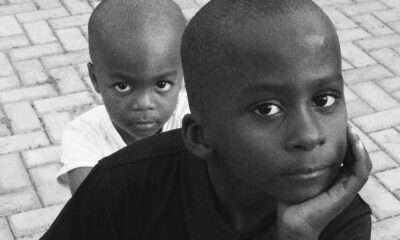News
Only 42% of SA Preschoolers Are On Track: What It Really Means for Our Future

“If the beginning of the story is weak, the chapters that follow will always be harder to write.”
Those were the words of Basic Education Minister Siviwe Gwarube this week as she unpacked the sobering results of the 2025 Thrive by Five Index, the country’s most comprehensive early childhood development (ECD) report.
And the results? Eye-opening. Only 42 percent of South Africa’s preschoolers are currently meeting their developmental milestones.
Startling Gaps Before Grade R
The Thrive by Five Index, the largest study of its kind in Africa, lays bare just how fractured early learning is in this country. It reveals that children in high-fee preschools are nearly twice as likely to be developmentally on track compared to their peers in low-fee centres. That means your ZIP code, and not your potential, can shape your ability to hold a pencil, follow instructions, or recognise letters before you’ve even reached Grade 1.
And it’s not just about reading and numbers. Just 29 percent of children are on track with essential fine motor and visual coordination skills, the kinds needed to write, draw, or even build the basics of focus.
Poverty’s Lasting Mark
Poverty remains the shadow trailing too many South African children. The index shows that 7 percent of enrolled four-year-olds are suffering from moderate to severe stunting. In practical terms, this places them an average of five months behind their peers, a gap that grows harder to close with time.
Minister Gwarube linked these delays directly to structural inequalities, including malnutrition, inadequate care, and poor living conditions. These are not just health issues; they’re learning issues too.
No Books, No Boost
Perhaps the most haunting statistic of all? Only 11 percent of families with enrolled children have more than five children’s books at home. And over a quarter of families have none. Among households with non-enrolled children, the numbers are even bleaker, with 77 percent reporting zero access to children’s books.
In many communities, homes are not filled with stories, songs, or opportunities to build vocabulary. This gap in language exposure sets the stage for lifelong learning difficulties, often before formal education even begins.
Where Do We Go From Here?
Minister Gwarube laid out four urgent national priorities:
-
Predictable subsidies for ECD centres, especially in low-income communities
-
Empowering and training ECD practitioners
-
Integrated support combining health, nutrition and parenting guidance
-
A stronger Grade R, built as a proper transition into primary schooling
But here’s what matters just as much: the home. The village. The everyday talk between child and caregiver. The paper and crayon were offered freely. The time taken to explain, to name, to laugh.
Because learning doesn’t begin in a classroom; it begins at home, at crèche, in taxi queues, and in kitchen conversations.
A National Wake-Up Call
Social media hasn’t stayed silent. On X and Facebook, hashtags like #ThriveByFive and #ECDNow have begun trending, with parents, teachers, and NGO workers calling for more urgency, more funding, and more local action.
Yes, the state has allocated R10 billion toward early learning, but that money must translate into real, visible outcomes. A child’s zip code should not be a barrier to their development. Every child, no matter where they live, deserves to arrive at Grade 1 ready to learn, grow, and thrive.
The Bigger Picture
If we continue to ignore the first five years, we’re not just setting back a generation, we’re losing the very foundation of our future workforce, thinkers, and leaders. This isn’t just an education issue. It’s a national development issue.
South Africa doesn’t need miracles to turn this around. It needs commitment. It needs homes filled with stories. And it needs a preschool system where no child is left behind simply because they were born on the wrong side of the income divide.
Also read: Operation Dudula to Zanu-PF, ‘Fix Your Own Healthcare First’
Follow Joburg ETC on Facebook, Twitter, TikT
For more News in Johannesburg, visit joburgetc.com
Source: The Citizen
Featured Image: Jozikids



























